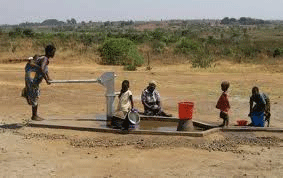‘SUSTAINABLE Energy for All’, the United Nations theme for the year 2012, is a worthy vision that is strongly associated with the fight against Climate Change – the major environmental concern of our time.  Fossil Fuels, associated with the release of greenhouse gases, particularly carbon dioxide (CO2), into the atmosphere, continue to be used throughout the world every day. As a developing country we may not be able to completely switch to alternative energy sources as soon as we would like, but we can take some steps towards energy conservation. A good place to start is in our homes and at work. By being energy efficient, we can collectively help to reduce our carbon footprint (carbon emissions resulting from our daily activities) and also save money. Many people worldwide are already practicing energy saving habits and making use of natural sources of energy.
Fossil Fuels, associated with the release of greenhouse gases, particularly carbon dioxide (CO2), into the atmosphere, continue to be used throughout the world every day. As a developing country we may not be able to completely switch to alternative energy sources as soon as we would like, but we can take some steps towards energy conservation. A good place to start is in our homes and at work. By being energy efficient, we can collectively help to reduce our carbon footprint (carbon emissions resulting from our daily activities) and also save money. Many people worldwide are already practicing energy saving habits and making use of natural sources of energy.
Here are some tips to get you started on an energy efficient lifestyle:
• Turn off all appliances that are not in use: lights, television, stereo, computer/laptop, etc.
• Utilize natural light when possible by opening windows or drawing the curtains to allow sunshine to enter.
• Replace incandescent light bulbs with energy saving ones – these use as much as two-thirds less energy and last longer.
• Service appliances such as wall and ceiling fans to ensure they are working efficiently. Vehicles such as cars, buses and motorcycles should also be serviced to ensure efficient use.
• Control use of machines/equipment that utilize electricity such as washing machines and air conditioners. Practice washing only when there is a full load of clothes. Also install a thermostat to automatically switch off ACs at a certain temperature range.
• Charge mobile phones fully once every few days instead of putting it to charge every day/night.
• Buy energy saving devices. Many brands of TV, mobile phones and other electronics are now made to utilize less energy.
• Instead of using security light all night we can invest in motion detector security lights which will only come on if there is movement within a certain range.
• Drive sensibly: speeding, accelerating rapidly and braking all waste gasoline.
• Utilize public transportation when possible. Consider car pooling on some days with colleagues. Also, consider walking from one point to another instead of using a vehicle.
• Plan routes to cover errands in one trip instead of going back and forth as this would waste gasoline.
Guyana can benefit greatly by seeking alternative sources of energy and some strides have been made in this regard through solar and hydro-energy usage by individuals and communities. The prospect of generating energy from the Amelia Falls Hydropower Project is certainly a big step for Guyana towards ‘Sustainable Energy for all’ and a green economy.
Find your way through the light bulb maze below as you think about ways you can conserve energy at home!



.jpg)









